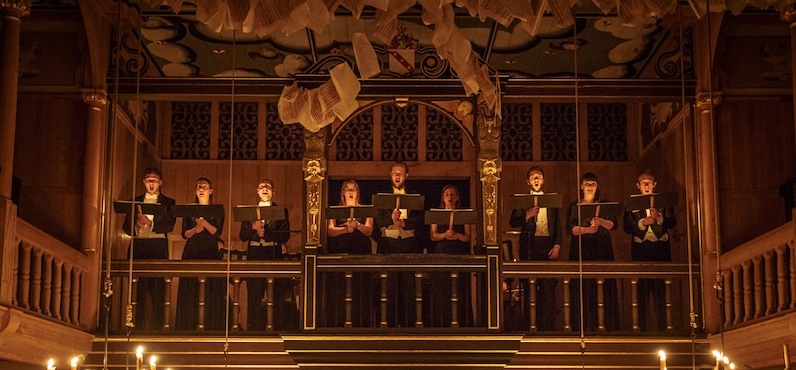All The Angels: An Interview with Michael Haslam
We sat down with Michael Haslam, Musical Director of All The Angels, to talk about this exciting new musical production of the story of how Handel wrote his masterpiece Messiah.

Michael Haslam is a three-time Olivier award-winning musical director who works in theatre, TV and radio as a composer, arranger and conductor. Haslam sat down with London Calling to talk about the new production of All the Angels at the Sam Wanamaker Playhouse at Shakespeare's Globe. This musical play is based on the true story of how Handel wrote Messiah, one of the most famous and frequently performed choral works in the world.
London Calling: What is the story of All the Angels?
Michael Haslam: George Handel, an immigrant composer from Germany, was at the top of the musical tree in Britain. For a long time he had written Italian Operas, which were very fashionable, it was all the upper classes wanted to see, but suddenly the bottom fell out of the opera market, no one was interested and he lost a lot of money. He had had enough of London and Italian Opera. Luckily he was sent a libretto for a new oratorio; every single word was from the Bible. Oratorios still have a narrative like an opera but they aren’t theatrical. The first performance of this new oratorio was going to be in Dublin. The actress Mrs Cibber had just arrived in Dublin because she was escaping a terrible London scandal. Handel had always used the best singers, but he got it into his head that he wanted Mrs Cibber to sing in this new, incredibly important religious work, even though she wasn’t a trained singer.
LC: Have you cast an actress or a singer in this role for your production?
MH: That is what is really interesting, you have to cast an actress who sings, not a singer who acts, for the role of Mrs Cibber. There’s an element of life imitating art in this play. Our Mrs Cibber - Kelly Price - is an actress who sings, and we have on stage with her four fully trained singers from Genesis Sixteen (The Sixteen choir’s junior division), yet every night Kelly has to go out and top them! It means that Kelly is absolutely going through the neuroses that Mrs Cibber goes through.
LC: When you’re working with classical music in a theatrical context, do you need to handle the musical performance differently?
MH: The basic elements for a convincing performance are the same: the energy, truth, emotion and communication of the text. It’s the same wherever you are: concert platform, theatre, church; otherwise you’re just making a noise. Where the difference lies in is the priorities. In a play the priority is the narrative, so the story of that particular piece of music you’re performing can have a different context to what it would have if it were being performed at a concert. Nick Drake the playwright has been very clever in the way he uses excerpts from Messiah to subtly reference what’s going on in the play in order to drive the narrative forward.

Credit: Marc Brenner
LC: What different musical elements are you using to create the show’s soundscape?
MH: Most of the music is from Messiah, but often we just hear little chunks of it. I’m working with Jonathan Munby the director on where we can introduce underscore (playing music quietly underneath the dialogue) which really makes the play come to life. We have an orchestra of two violins, one cello and myself at the harpsichord. There’s the potential at the Globe to use musical and non-musical sound effects. There’s a storm near the beginning of the play and the Globe have wind machines and big metal sheets used for making thunder, which are all authentic to the period.
LC: The Sam Wanamaker Playhouse is intricately designed in the style of a Jacobean candlelit indoor theatre. How does sound work in that space?
MH: It’s got the most gorgeous acoustic. You never have to push or force the voice. I’m not an acoustician but everyone says that to get a good acoustic just use natural materials like wood, stone and glass, which is what this space is made of.
LC: Much is made in this play of the idea of the singing voice communicating not simply that personal singer’s sorrow, but reaching a higher, all-encompassing collective sorrow, which is the thing that moves people. How are you trying to achieve this?
MH: It would be great if I could pull a switch that turns us all onto transcendent mode so that everyone is automatically moved. But of course there is no way of guaranteeing that. We all have our own set of triggers but for me as a musical director it’s about being as truthful as possible to the text so that you are in the best position to realise what the composer wants from their music. It’s about being open, not going in with your blinkers on in terms of how the music ‘should’ be. I think there’s something that comes out of the collaboration of actors, musicians, the director and the staging where you just have to trust that everyone is working to the best of their abilities and that the combination of all those different elements is what makes the performance become transcendent. Everyone in our rehearsal room is keenly aware of the stakes.
All the Angels runs from 6 December 2016 to 12 February 2017 in the Sam Wanamaker Playhouse at Shakespeare’s Globe. For more information and tickets, please see the Shakespeare Globe website.